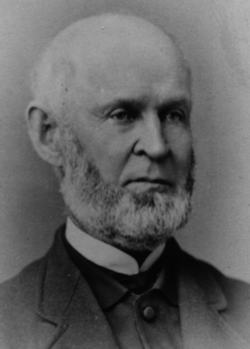Roger Hooker Leavitt facts for kids
Roger Hooker Leavitt (born July 21, 1805 – died July 17, 1885) was an important landowner and early businessman in Massachusetts. He was also a politician who, along with his family, strongly supported the movement to end slavery, known as abolitionism. His home in Charlemont, Massachusetts was a secret stop on the Underground Railroad. This was a network of safe houses and routes that helped enslaved people escape from the South to freedom. One person who found safety in Leavitt's home was Basil Dorsey, who lived there for almost six years.
Contents
A Family Against Slavery
Roger Hooker Leavitt was born in Heath, Massachusetts. His parents were Roger Leavitt and Chloe (Maxwell) Leavitt. His father was a wealthy landowner and businessman who also served in the state government. He was a strong abolitionist too. Roger Hooker Leavitt followed in his family's footsteps. He went to Hopkins Academy and briefly studied at Dartmouth College. Like his father, he also served in the Massachusetts Senate.
The Leavitt Family's Abolitionist Roots
The Leavitt family had a long history of fighting against slavery. Roger Hooker's brother, Joshua Leavitt, became a social reformer. He worked to end slavery and promote the temperance movement (which encouraged people to drink less alcohol). Joshua later became the editor of an abolitionist newspaper called The Emancipator. He also played a key role in defending the enslaved people who rebelled on the ship Amistad. In 1833, Joshua helped start the New York Anti-Slavery Society.
Joining the Fight
In October 1835, Roger Hooker Leavitt joined his brothers Joshua and Hart at an anti-slavery meeting in Utica, New York. This meeting faced violence from people who supported slavery. However, this event made the Leavitt brothers even more determined. It also convinced their parents to fully support the abolitionist cause. By the next year, Roger Hooker Leavitt was leading the Franklin County Anti-Slavery Society. He was also a vice-president of the Massachusetts Anti-Slavery Society in 1838–39. His father even ran for Lieutenant Governor of Massachusetts with the Liberty Party, a political group that his son Joshua helped create.
Helping Enslaved People Escape
Roger Hooker Leavitt was especially known for giving shelter to enslaved people who had escaped. One of the most famous people he helped was Basil Dorsey. Basil escaped from Frederick County, Maryland on his own in 1836.
A Safe Stop on the Underground Railroad
It seems that Roger Hooker Leavitt's home became well-known among abolitionists as a safe place. A local resident later said that people knew Mr. [Hosea] Blake's and Mr. Leavitt's homes were resting places. This work was kept very secret. This was because there was great danger not only for the enslaved people but also for those who helped them.
Basil Dorsey's Story
In 1836, after Basil Dorsey escaped, Joshua Leavitt, who lived in New York City, helped Basil and his wife find safety in Massachusetts. They found refuge at Roger Hooker Leavitt's home. Records from Charlemont show that Basil Dorsey's son, Charles Robert Dorsey, was born there in 1838. Two of Basil's older children, born in Maryland, were also in town. Even though official records from 1840 didn't show any people of color living with the Leavitt family, other records confirm Basil Dorsey's presence. For example, the Massachusetts Anti-Slavery Society records show that 'B. Dorsey' from Charlemont gave 50 cents to the cause in 1839.
Shortly after Basil Dorsey arrived in Charlemont, his first wife passed away. Roger Hooker Leavitt's first wife also died that same year. Joshua Leavitt wrote to his brother Roger Hooker, saying he felt for Mr. Dorsey and trusted that Roger would provide Christian care.
It was likely an open secret in the community that the Leavitts were helping enslaved people. Many people who thought like them worked together with the Leavitts and others who offered shelter. Even years later, in 1895, a woman from Franklin County, Massachusetts described Leavitt as a "whole souled Abolitionist." She said he did everything he could to help enslaved people gain freedom.
By 1844, Basil Dorsey moved to other housing, probably in Florence, Massachusetts. He had lived with the Leavitt family for over five years. He stayed at Roger Hooker's home, his brother Hart's nearby farm, or his father Roger's home. It is likely he stayed at all three places. Records from that time show that the family was helping other escaped enslaved people during this period.
Later Life and Legacy
Roger Hooker Leavitt passed away in Waterloo, Iowa, while visiting his son John Hooker Leavitt. The New York Times newspaper wrote about his death. It mentioned his work as an abolitionist and called him a "prominent and leading citizen of Franklin County." Leavitt is buried at the Leavitt Cemetery in Charlemont.
The letters and writings of Joshua Leavitt, his brothers Roger Hooker and Hart, and their father Roger, from 1812 to 1871, are kept at the Library of Congress in Washington, D.C. Roger Hooker Leavitt's home is now part of the Academy at Charlemont campus. It is also recognized by the National Park Service as part of the National Underground Railroad Network to Freedom. The former Charlemont home of Roger Hooker Leavitt's brother Hart and his wife Mary is also on this network.
See also
- Joshua Leavitt
- Hart Leavitt
- John Hooker Leavitt
 | Kyle Baker |
 | Joseph Yoakum |
 | Laura Wheeler Waring |
 | Henry Ossawa Tanner |


